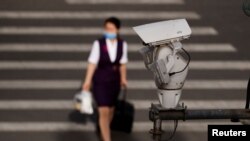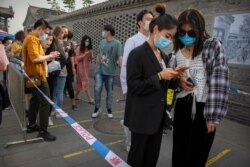Governments around the world have used the COVID-19 pandemic as their reason for expanding digital surveillance and collecting more data from their citizens, according to a report published Wednesday.
The annual Freedom on the Net report, published by democracy and human rights research group Freedom House, found that state and nonstate actors cited COVID-19 to justify expanded surveillance and the deployment of new technologies that were once seen as too intrusive.
Advocates warned that these new technology systems developed to conduct contact tracing and enforce quarantines could be abused and made permanent, particularly in authoritarian countries like China, which was ranked the world’s worst abuser of internet freedom for the sixth consecutive year.
"History has shown that technologies and laws adopted during a crisis tend to stick around," Adrian Shahbaz, Freedom House's director for technology and democracy and a coauthor of the report, said in a statement. "As with 9/11, we will look back on COVID-19 as a moment when governments gained new, intrusive powers to control their populations."
The report again singled out China for specific criticism as the world’s worst abuser of internet freedom, but Beijing also found new methods of digital surveillance in the pandemic.
The report noted that Chinese authorities combined low- and high-tech tools not only to manage the outbreak of the coronavirus, but also to deter internet users from sharing information from independent sources and challenging the official narrative.
The report concluded “the pandemic is normalizing the sort of digital authoritarianism that the Chinese Communist Party has long sought to mainstream.”
“China's government already was sitting on the most sophisticated and multilayered censorship and internet control apparatus around the world,” said Sarah Cook, a senior researcher at Freedom House.
Technology spreads
She added that what is unusual this year with COVID-19 is these tactics were being used regarding public health. Surveillance technology developed in the Xinjiang region — such as handheld devices for pulling data from citizens' phones — is now proliferating in other parts of the country.
There also are certain upgrades in these surveillance technologies, such as refining facial recognition technology to be able to identify people who are wearing masks or forcing people to use various color-coded health apps in China to track citizens’ infections.
“These really don't protect privacy and there are research initiatives that indicated that they even had a backdoor to the police,” Cook continued.
In addition, Freedom House researchers say individuals around China also have reported pandemic-related intrusions, like being told to put webcams inside their houses and outside their doors for alleged quarantine enforcement.
Apart from the heavy surveillance, Cook said the spread of COVID-19 is directly related to Chinese Communist Party speech controls on the internet.
WeChat users
“The very thing we flagged last year as a problem in terms of monitoring of WeChat users and reprisals against WeChat users is exactly what happened to doctors like Li Wenliang, who initially tried to share information about this emerging SARS-like virus,” she said.
“So, I think there's really this very intimate connection between the outbreak overall and the fact that China is the worst abuser of internet freedom around the world.”
Elsewhere in the world, Iceland is said to have the greatest internet freedom, followed by Estonia and Canada. The report listed U.S. in seventh place, with internet freedom worsening for the fourth year running.






